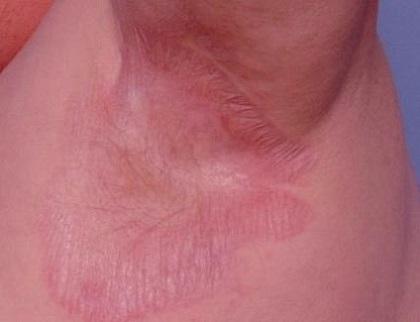Thailand medical scientists discover that Lichen Sclerosus is linked to higher risk of diabetes and cardiovascular diseases
Nikhil Prasad Fact checked by:Thailand Medical News Team Aug 24, 2024 7 months, 2 weeks, 6 days, 6 hours, 1 minute ago
Thailand Medical: A recent meta-analysis conducted by a team of researchers from multiple esteemed institutions in Thailand has uncovered significant associations between lichen sclerosus (LS), a chronic inflammatory skin disease, and various cardiovascular risk factors, including diabetes mellitus. This
Thailand Medical News report delves into the key findings of this study, which highlights the potential health risks faced by individuals with lichen sclerosus (LS).
 Thailand medical scientists discover that Lichen Sclerosus is linked to higher
Thailand medical scientists discover that Lichen Sclerosus is linked to higher
risk of diabetes and cardiovascular diseases
Understanding Lichen Sclerosus
Lichen sclerosus is a chronic skin condition characterized by inflammation, thinning of the skin, and changes in the dermis. It predominantly affects the genital area, particularly in women, and is most commonly seen in two age groups: prepubertal children and postmenopausal women. Symptoms can range from mild itching to severe pain, and in some cases, the disease can cause significant scarring and disfigurement.
Despite being relatively common, the exact cause of lichen sclerosus (LS), remains unclear. Various factors, including genetic predisposition, autoimmune responses, and microvascular injury, have been suggested as potential triggers. LS is often underreported due to the asymptomatic nature of the disease in some patients, making it challenging to estimate its true prevalence.
The Study and Its Findings
The research team, comprising Thai experts from Phaholpolpayuhasena Hospital, Chulalongkorn University, Burapha University, Thammasat University, Mahidol University, and the Institute of Dermatology-Thailand conducted a systematic review and meta-analysis to explore the relationship between lichen sclerosus (LS), and cardiovascular risk factors. This article discusses the findings that emerged from analyzing data from 16 studies involving over 430,000 participants.
The meta-analysis revealed a significant association between LS and an increased risk of developing type 2 diabetes mellitus. Specifically, the odds of having diabetes were found to be more than twice as high in individuals with lichen sclerosus (LS), compared to those without the condition. The study also identified a trend of increased risk for other cardiovascular conditions, including hypertension, dyslipidemia, obesity, and metabolic syndrome, although these associations were not statistically significant.
Diabetes Mellitus and lichen sclerosus (LS)
Among the most notable findings was the strong link between LS and diabetes mellitus. The researchers observed that individuals with LS were over twice as likely to develop diabetes compared to those without LS. This significant association suggests that the inflammatory and microvascular changes seen in LS may contribute to the development of diabetes.
The study highlighted the role of chronic inflammation in lichen sclerosus (LS) which could lead to endothelial dys
function and microvascular injury. These changes are known to be involved in the pathogenesis of diabetes mellitus, particularly in the progression of insulin resistance and the development of type 2 diabetes. The researchers also noted that the deposition of C5b-9, a protein complex involved in the complement system, in the microvasculature of LS patients might play a role in this increased risk.
Other Cardiovascular Risks
While the association between lichen sclerosus (LS) and diabetes was the most robust finding, the study also explored potential links between LS and other cardiovascular risk factors. The odds of developing hypertension, dyslipidemia, and obesity were higher in LS patients, though these findings did not reach statistical significance.
The trend towards increased cardiovascular risk in LS patients is consistent with observations in other chronic inflammatory skin conditions, such as psoriasis and atopic dermatitis. Chronic inflammation is a common feature in these diseases and is thought to contribute to the increased cardiovascular morbidity observed in affected individuals.
Implications for Clinical Practice
The findings of this study underscore the importance of cardiovascular risk assessment and management in patients with LS. Given the significant association between lichen sclerosus (LS) and diabetes, healthcare providers should consider routine screening for diabetes in patients diagnosed with LS, particularly those with additional risk factors such as obesity or a family history of diabetes.
Furthermore, the potential link between LS and other cardiovascular conditions suggests that a multidisciplinary approach to managing LS patients may be beneficial. This could include collaboration between dermatologists, endocrinologists, and cardiologists to monitor and address cardiovascular risks in these patients.
Conclusion
The study conducted by the Thai research team provides compelling evidence of the association between lichen sclerosus and an increased risk of type 2 diabetes mellitus, with potential links to other cardiovascular risk factors. These findings highlight the need for vigilant cardiovascular screening and management in patients with lichen sclerosus (LS) who may be at a higher risk of developing serious health conditions.
The study findings were published in the peer-reviewed journal: Journal of Clinical Medicine.
https://www.mdpi.com/2077-0383/13/16/4668
For the latest on lichen sclerosus, keep on logging to
Thailand Medical News.
Read Also:
https://www.thailandmedical.news/news/thailand-medical-researchers-discover-peptide-from-scorpion-venom-to-treat-drug-resistant-pseudomonas-biofilm-infections
https://www.thailandmedical.news/news/thailand-medical-scientists-discover-that-extracts-of-vernonia-amygdalina-can-induce-apoptosis-in-certain-cancer-cell-lines
https://www.thailandmedical.news/news/thailand-medical-researchers-leverage-3d-printing-to-produce-tablets-containing-mucuna-extract-to-treat-erectile-dysfunction
